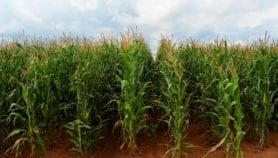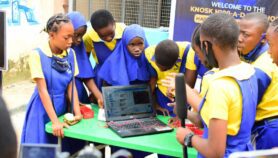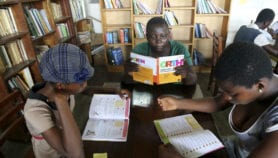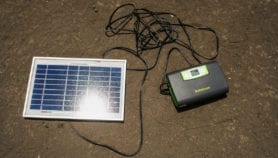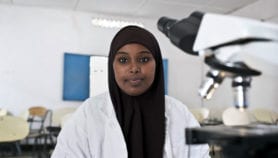By: Esther Nakkazi
Send to a friend
The details you provide on this page will not be used to send unsolicited email, and will not be sold to a 3rd party. See privacy policy.
The global South must spearhead solar geoengineering R&D to highlight the poor’s plight, writes Esther Nakkazi.
Despite developing countries contributing nearly 0.1 per cent of the global emissions to climate change, they suffer more than 90 per cent of the global impacts because of their inability to adapt to climate change, according to the Global Climate Change Regime report published in 2013.
As countries grapple with the challenges of tackling climate change, a new approach — solar radiation management (SRM) or solar geoengineering — which is being discussed as a way to cool the planet fast, is spearheaded by developed countries.
But scientists from the developing world are strongly rooting for the global South to lead solar geoengineering research to reduce some of the impacts of climate change.
What is SRM?
SRM is a novel idea that aims to minimise some risks of climate change by bouncing back or blocking out a small percentage of sunlight entering the planet.
As a climate change mitigation mechanism, solar geoengineering involves spraying reflective aerosols into the upper atmosphere in order to cool the planet. “If SRM works well and can reduce some of the impacts of climate change – as models indicate that it could – then developing countries have the most to gain,” says Nelson Torto, a professor in analytical chemistry and the executive director of the African Academy of Sciences (AAS).
Torto and ten other experts from developing countries are signatories to a comment on SRM published in Nature in April this year.
“If SRM goes wrong, or if there are nasty surprises waiting for us amongst the large uncertainties about its impacts, or if it’s used as an excuse for continued fossil fuel emissions, then it’s the world’s most vulnerable people who will suffer,” Torto tells SciDev.Net. “The stakes are high and developing countries, therefore, need to be central to any efforts to research or discuss SRM”.
Samuel Okulony, a climate change expert at the Africa Institute for Energy Governance, Uganda, adds that climate change is a complex situation that cannot just be addressed by one or two interventions.
SRM is one effective ways that can allow sustainable development while fighting climate change, Okulony says.
“With SRM, it both enables gain and loss for developing countries.”
Samuel Okulony, Africa Institute for Energy Governance
“With SRM, it both enables gain and loss for developing countries,” Okulony explains. “Gaining in a sense that SRM is a concept that fights climate change in space before it reaches the environment…Losing because of the high investments costs involved that most developing countries are not willing to invest in.”
Okulony notes that the narrative of fighting climate change in developing countries has been reduced to planting more trees, cutting carbon emissions, investing in renewable energy technologies and shifting from fossil fuel use, which economists can argue as one concept that propels poverty as opposed to industrialisation that creates jobs and increase incomes.
The authors of the Nature article argue that most of the solar geoengineering research is being done in the “well-heeled universities of Europe and North America”, and call for developing countries to lead on the research and evaluation of SRM.
Through the new SRM modelling fund for scientists in the South called the Developing Country Impact Modelling Analysis for SRM (DECIMALS) fund, scientists in developing countries are finding solutions to the lack of funding for solar geoengineering research.
The DECIMALS fund was set up by the SRM Governance Initiative (SRMGI), an international, non-governmental organisation-driven project that seeks to build developing countries capacity to take part in research and discussion of SRM.
The DECIMALS fund is being administered by The World Academy of Sciences (TWAS) and the SRMGI, with funding support from the Open Philanthropy Project.
Making SRM research African agenda
In an effort to kick-start conversations about SRM research and its governance, and discussing how the issue should be addressed by African countries, the AAS collaborated with the SRMGI to organise workshops in Ethiopia, Kenya, Senegal and South Africa in 2012-2017.
A developing world research fund was one of the ideas that participants first suggested in Senegal in 2012 to support developing country scientists who want to model the potential impacts of SRM.
“If developing countries are going to oppose the use of SRM then their arguments need to be backed up by the best evidence,” says Torto. “If they are going to influence the direction of research, then they need to know about how SRM could affect us.”
Andy Parker, the project director of the SRMGI, agrees, adding, “By building the capacity of people in developing countries to work on SRM research and governance, SRMGI is creating the conditions for more equitable open and informed consideration of the merits and drawbacks of SRM.”
The grants call ended on 29 May 2018 and will fund scientists who want to understand how SRM might affect their regions.
According to Parker, the SRMGI got nearly 80 applications for what may probably be six to eight grants.
Each DECIMALS fund will support a small research team, two to four scientists, over about two years with up to US$70,000.
“We hope that developing country voices, informed by developing country scientists, will be leading this discussion.”
Nelson Torto, African Academy of Sciences (AAS)
Parker says that the DECIMALS fund will also support other activities such as attending a research planning workshop at TWAS in November 2018. DECIMALS researchers will collaborate with each other and with SRM experts to build South-South and South-North networks.
“It is hoped that this will provide a foundation for more sustained developing country engagement with SRM research and its governance,” he says, adding that the support includes publication in open access journals and holding workshops to discuss the implications of their research.
“This will further expand the discussion of SRM, bringing a critical conversation out of the lab and into a wider community,” Parker adds.
SRM cloaked in uncertainties
But SRM is marred with controversy, uncertainty, and difficult governance with sociopolitical challenges outweighing scientific ones.
According to Parker, SRM research might distract members of the public and politicians from the crucial job of cutting emissions of greenhouse gases.
Torto explains, “It’s safe to say that no countries anywhere in the world have policy frameworks for conducting SRM…There is a huge amount of research and discussion to be done before we could ever consider deployment.”
Parker says that participants from the developing world who have attended SRMGI workshops are typically skeptical of SRM use just as are people in the global North.
“But the argument is that developing country scientists need to be involved in research so they can both work out what the regional benefits and risks might be and also so that they can build up local expertise that can inform negotiating positions, for instance,” Parker tells SciDev.Net.
Political and scientific dilemma
SRM’s other main challenges are that of decision-making, which squarely lies on politicians who may face a dilemma on whose voices to listen to and other sticky questions such as who has a right to use or reject it, or indeed to allow the temperature to keep rising, according to the authors of the Nature article.
“We hope that developing country voices, informed by developing country scientists, will be leading this discussion and making sure that the plight of the most vulnerable is the central concern,” Torto says.
Shem Wandiga, a professor of chemistry at the University of Nairobi’s Institute for Climate Change Adaptation, Kenya, says, “Even if the research was proven, it is, in my mind, unthinkable that developing countries will have resources to invest in this science intensive and expensive equipment dependent programme.”
He is calling on the southern researchers to produce data that proves the process works or not, and to lead the argument. “The southern researchers will learn the technology and own the technology by building their own instruments, the north driven research has not helped us much. In some cases such research cannot be reproduced in the south. To have the knowledge in the south is a big gain.”Also, the developing world has no policy on SRM as the technology is in its infancy. “The technology is not yet developed, but it is good that we begin to think about it and study it. As a scientific pursuit of knowledge, the south scientists should be engaged and involved,” Wandiga tells SciDev.Net.
Whatever the arguments advanced by the scientists, it is clear SRM research poses serious challenges to the developing world and its undertaking will require intense thinking and huge investments for well informed decisions.
This piece was produced by SciDev.Net’s Sub-Saharan Africa English desk.
References
[1] The Global Climate Change Regime (International Institutions and Global Governance Program, 19 June 2013
[2] A. Atiq Rahman and others Developing countries must lead on solar geoengineering research (Nature, 3 April 2018)




